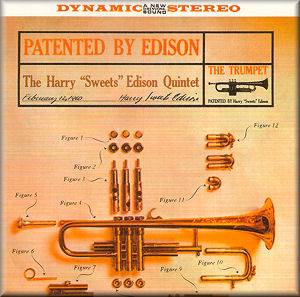1. Witchcraft
2. Blue Skies
3. I'm Confessin' that I Love You
4. Ain't Misbehavin'
5. Candied Sweets
6. They Can't Take That Away from Me
7. Tea for Two
8. There is No Greater Love
9. Twenty-forty
10. It's Easy to Remember
11. Sweetcakes
12. Angel Eyes
13. Centerpiece
14. Candy
15. Jive at Five
16. Imagination
17. Louisiana
18. Harriet
19. It Happened in Monterey
20. If I Had You
21. Paradise
22. Indiana
23. Pussy Willow
24. Sweetenings
Harry "Sweets" Edison - Trumpet
Jimmy Forrest - Tenor sax (tracks 1-13, 20, 22, 23)
Tommy Flanagan - Piano (tracks 1-12)
Tommy Potter - Bass (tracks 1-12)
Elvin Jones - Drums (tracks 1-12)
Jimmy Jones - Piano (tracks 13-17, 20, 22, 23)
Kenny Drew - Piano (tracks 18, 19, 21, 24)
Joe Benjamin - Bass (tracks 13, 20, 22, 23)
John Simmons - Bass (tracks 14-19, 21, 24)
Charlie Persip - Drums (tracks 13-24)
This album comprises two original LPs, now available together on
CD for the first time. The first 12 tracks come from Patented by
Edison, recorded in 1960, and the last 12 are from Sweetenings,
recorded two years earlier. Despite the differing personnels on each
album, the format is basically the same: mainly short tracks featuring
Harry Edison himself, with the other players somewhat in the background.
The results might threaten to be samey, except that Edison is always
worth hearing, with his judicious choice of notes and his soft, unassertive
tone. It is no surprise that Frank Sinatra wanted Harry to be on many
of his recordings with Nelson Riddle's orchestra, because the trumpeter
could always supply an inimitable touch of sophistication without
overpowering the singer.
Of course, there are the Edison clichés that we have come to expect
- in this case, rather too many downward glissandi on single held
notes, which fill many a gap in his improvisations. But these are
balanced out by the way that he makes every note count, as if it has
been carefully chosen from a wealth of possibilities. Harry's long
years with Count Basie - an almost unbroken sequence from 1937 to
1950 - imbued him with a laid-back approach which never flaunts itself
but does good by stealth.
Edison is well served by his accompanists, who don't get many chances
to shine as soloists but provide excellent support throughout - especially
when Edison chooses to finish a number in an unpredictable way. Pianist
Tommy Flanagan makes the most of his few opportunities. Saxist Jimmy
Forrest fits in well with Edison, and his velvet-toned tenor sax comes
through well in his solo on Pussy Willow. All the bassists
on these sessions lay down a solid beat. On the first dozen tracks,
it is interesting to hear drummer Elvin Jones proving that he could
play "straight" - in a much less busy style than he used
with John Coltrane.
Tracks of particular note include Edison's composition Centerpiece
- heard here for the first time but destined to become a popular jazz
standard. In later manifestations, the tune was often taken at a faster
tempo than the leisurely speed here. Although most of the tunes are
from the Great American Songbook, Harry wrote seven of the 24 numbers
(or eight if you count his collaboration with Basie on Jive at
Five - note how Harry bends notes in this piece). The Edison originals
include the boppish Twenty-Forty (with strong drumming from
Elvin), Sweetcakes which has a bright solo from Tommy Flanagan,
and Harriet which is based on Thelonious Monk's Blue Monk.
The transfers to CD are fine. With 68 minutes of superb but unpretentious
music, this album is indeed a bargain.
Tony Augarde
